by Sgt. W. Patrick Swanton, Waco Police Department
As we enter Police Memorial Week here in Central Texas, our hearts are heavily burdened with sadness at yet another loss for our brothers and sisters in Killeen. We can only imagine the sadness our friends are experiencing and send them our deepest and most sincere thoughts and prayers.
The unfortunate reality is that far too many officers are losing their lives in the line of duty. So far in 2014, communities in just the United States alone have lost forty-one Police Officers due to various events. We know that every day we go to work may be our final roll call. But I often wonder…do people realize what it is we are dying for? Have you ever really stopped and thought …why did that officer die?
Let me try to explain what it is that causes us to put ourselves in harm’s way. What it is that makes us run to the sound of gunfire when common sense tells you to run away; what it is that causes us to go down a darkened hallway looking for the deranged individual that just killed his family, or even something that is as simple as stopping a car for a traffic violation at 2:00 in the morning…on a lonely road…not knowing the man in the car had just picked up his monthly supply of meth and knows if he gets arrested he is a three-time loser and goes back to prison forever.
It’s you…our community, our friends and our neighbors. It’s YOU!!! Whether you like us or not, if we know you or not, or even if we have arrested you before; it makes no difference to us as we are tasked with keeping all safe. It is you that we stand watch for every day we wear the badge. It really is just that simple.
We don’t do it for the money, the glory or the occasional free cup of coffee and we certainly don’t do it to be called heroes or to make the local headlines; we simply do it because we believe in right and wrong. We believe that without someone to stand up to the bullies, punks, thugs, and killers in our world, there would be chaos.
No…we are not perfect, not always charming and sometimes not even friendly…but we are always there. We really are just a phone call away and ready to come running in the blink of an eye. I still say this after thirty-four years of policing…Law Enforcement is a noble profession and one I’m proud to be a part of.
We lose sometimes and that’s the most terrible part of this job. That is the one thing that makes this job almost unbearable. For some living in the aftermath, it will be the final straw. Knowing that some heartless, cowardly dirtbag was able to take one of us down leaves us with an incredible feeling of loss that unless you wear the badge or love one of us that does, is difficult to comprehend.
The feeling we get when an “Officer Down” call is dispatched is indescribable and haunts our nightmares continuously. But what is important to know is that we learn. We learn how to get better, we learn how to adjust and we learn how to heal…heal but not forget. And though it is hard to see at times…not one of us goes in vain as we all believe there is a lesson in everything. It’s unbelievable how those blue guardian angels whisper in our ear day in and day out…that doesn’t look right, or that car is out of place, or stay back and watch this guy a few minutes. More often than not they are absolutely right and we live to see another day.
It is paramount that we share our tears with our brothers and sisters in blue but more important than that is the fact that we will rise. We will be back at work tomorrow protecting those that expect it of us and even those that don’t invite it…we will keep watch over our responsibilities and do our best to keep the wolves at bay. And know this…we will never forget those that gave the ultimate sacrifice by giving their lives in the line of duty as we recognize this…John 15:13 Greater love hath no man than this, that a man lay down his life for his friends.
It is a sad time for our friends in Killeen and around the country for those communities that have lost officers in the line of duty. We mourn with you and pray for your healing. We stand together as the first line of defense for our communities and do so proudly.
To our citizens…it truly is you that we serve. Sometimes with the ultimate sacrifice.
 This week’s Blog was written by Sgt. W. Patrick Swanton, Spokesman for Waco Police Department. (Facebook: WacoPoliceDepartment; Twitter: WacoPolice)
This week’s Blog was written by Sgt. W. Patrick Swanton, Spokesman for Waco Police Department. (Facebook: WacoPoliceDepartment; Twitter: WacoPolice)
If you are interested in writing for the Act Locally Waco blog, please email [email protected]
.
Sgt. W. Patrick Swanton
Waco Police Department
by Ashley Bean Thornton and others…
The Greater Waco Community only has a certain amount of money allocated for transportation related expenses. Our city planners are asking to hear from us about how we would like to see it spent. They have invited us to give our input at a series of public information meetings. In a blog post last week, I shared some of my thoughts about transportation and specifically tried to make the case for having more emphasis on public transportation as a part of the overall transportation plan for our region.
Here are some other voices sharing their reasons for wanting a more robust system of public transportation in the Waco area:
(In a letter to the Editor of the Waco Trib)
I read with interest Ashley Thornton’s editorial (May 7) on transportation priorities in Waco, finding it compelling and informed.
As a person who works for an agency that helps older adults, I can affirm with Ashley that we have a public transportation system that is not adequate. Up until 2005, Meals & Wheels had a very busy transportation service which focused on the transit needs of older adults in Waco. However, due to funding shifts our transit program for older adults in the city basically dissolved. We were transporting 249 older adults taking 700 trips per month to clinics, hospitals, doctors’ offices, dentist offices, social service agencies, and dialysis centers.
At that time, it was decided by funding sources that the older adults of Waco could utilize the public transportation system or they could qualify for the ADA (physically challenged) vans. Echoing what Ashley reported, this would require older adults who did not qualify for ADA services, to walk to a bus stop, or flag down a bus, ride it to the hub downtown and then change buses to get where they needed to go.
Think about Waco – in a city that doesn’t have many sidewalks, this required people who were using canes or walkers, or who have mobility issues to walk on uneven surfaces or in the streets. Also, very few of the bus stops in Waco are covered, which means the older adults are at stops that have no protection from the weather. Would you want your mother waiting at a bus stop for an hour in 100 degree heat?
Navigating the bus system is also confusing for many of our older adults. We do not have signage that gives the bus routes. To Waco Transit’s credit, they did send out staff to train our former clients, who requested help, on how to use the bus system. However, I imagine these requests were few in number.
So what did they do without the curb-to-curb service? Many fell back on family and friends to take them where they needed to go. Others, some of whom shouldn’t be driving due to vision issues, drive their own cars. Some of our clients were quite capable of riding the Waco bus and have transitioned to that system. However, we still get calls every week from folks wanted to know if we’re giving rides again; or we receive a call from an adult child saying that their parent needs transit help because they shouldn’t be driving anymore.
I ask that the community lift its voice to say we need a variety of public transit options in Waco and share this need with the Metropolitan Planning District who is/was conducting the meetings on transit needs in Waco. We all have to work together to make Waco a community in which one can age well.
Sincerely, Libby S. Bellinger, Associate Director, Meals & Wheels
(In a response on Facebook to my blog post)
Having a decent, accessible, and reliable public transportation system is so important for any city. Having lived in NYC most of my life, it is something I always took for granted until I moved to Waco. I have many friends who don’t drive; they are lifelong New Yorkers, they have never had cause to learn. There are many reasons we should invest in better public transportation: reducing our city’s carbon footprint, being a more welcoming and accessible city for people with disabilities, attracting employees from large cities where public transportation is the norm, and providing a means of transportation to our neighbors who simply cannot afford a vehicle. There are multiple health reasons why a person may not drive. I have a friend whose sister had no choice but to move to a larger city with public transportation. Her sister has epilepsy, therefore she cannot drive. This person would have been a huge asset to our community. She has multiple graduate degrees, is a community builder, philanthropic, and just a very cool person. One of the interim ministers at a local congregation a few years ago was blind. She simply could not live here. She obviously worked on Sunday, yet was completely dependent on others for a ride, as busses don’t run on Sunday. Most people take health for granted, just as many Wacoans take having a car for granted. What would you do if due to an accident or illnesses you could not drive? Could you get to work? Would you be able to get to the market, medical appointments, place of worship, a friend’s house, anywhere?
— Carmen Saenz
(Another response on Facebook to my blog post)
And now the voice of a really senior citizen. We need affordable ways for seniors to get where they need to go such as to doctors, labs, therapy, grocery are necessary. It would be nice to have some entertainment venues accessible also. It would be nice to have access to library services. Perhaps we don’t contribute to the community from the point of view of many but if we had transportation we maybe could contribute. And, we’d grow older more slowly because of the mental stimulation interaction would provide. And, there is conceivably an undocumented safety issue here. Many seniors continue to drive after it is unsafe because they do not have an alternative.
— Joycie Gifford
If you agree that Waco needs more Public Transportation, please make your voice heard! There are two public input sessions remaining where you can speak directly with the representatives from the Metropolitan Planning Organization (MPO). They are : Monday, May 12, 2014 – 6 p.m. at South Waco Community Center, 2815 Speight and Thursday, May 15, 2014 – 12 Noon at Dr. Mae Jackson Development Center, City of Waco, 401 Franklin Ave.
If you cannot attend either of those meetings, you can submit your written comments directly to the MPO, as long as they are received no later than June 15. Suggestions may be submitted by fax at (254) 750-1605, by e-mail to [email protected] or by mail directed to Christopher Evilia at the following address: Waco Metropolitan Planning Organization, P.O. Box 2570, Waco, Texas 76702-2570.
Also, please consider writing a letter to the Waco Trib to help build up the community engagement around the issue.
Transportation planning is complicated and will involve trade-offs. There is simply not enough money to do everything that everyone would like to do in regard to transportation. Our city planners are asking for our input. If we do not give it to them, how can we expect them to prioritize the things that are important to us?
For more information about the Transportation Plan or the community input process, please visit the website: www.waco-texas.com/cms-mpo .
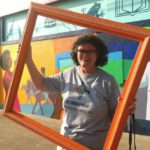 This Act Locally Waco blog post is by Ashley Bean Thornton, the Manager of the www.www.actlocallywaco.org website and the editor of the Friday Update newsletter. The Act Locally Waco blog publishes posts with a connection to these aspirations for Waco. If you are interested in writing for the Act Locally Waco Blog, please email [email protected] for more information.
This Act Locally Waco blog post is by Ashley Bean Thornton, the Manager of the www.www.actlocallywaco.org website and the editor of the Friday Update newsletter. The Act Locally Waco blog publishes posts with a connection to these aspirations for Waco. If you are interested in writing for the Act Locally Waco Blog, please email [email protected] for more information.
My first car was a yellow AMC Pacer complete with an in-dash 8-track player. It was very round and had huge windows. It was like driving around in a big glass egg. Sounds cool right? Coolness (or lack thereof) aside, from the moment I first turned the key in the ignition of that yellow Pacer until this very moment I have never seriously worried about transportation. A few flat tires and other mal-functions notwithstanding, I have always had an operable vehicle and the means to drive it just about anywhere I wanted to go. And, oblivious well-off person that I am, I have always taken that luxury more or less for granted.
According to the Census Bureau’s 2008-2012 American Community Survey 5-year estimates, there are over four thousand households in Waco with no vehicle available. Those of us who have always had cars may have to let the implications of that sink in for a bit before we can even imagine what life without a vehicle would mean on a day to day basis. I have always taken for granted, for example, that I could get to work at any hour that my employer required. If I forgot something I needed, I have always been able to run home at lunch and get it. I have always taken for granted that I could get the milk and ice cream home before it was spoiled. I have never had to think about how heavy my groceries were and whether or not I would be able to carry them all the way home. I have rarely thought twice about being able to drive to the doctor in air-conditioned comfort if I was feeling bad. For households with no vehicles, these “simple” day to day activities require planning and negotiation, and of course the planning and negotiation is made many, many times more complicated if there are kids in the picture.
Our city is designed around the notion that our residents have dependable transportation. For example, many of our children now attend schools in neighborhoods other than their own. Our grocery stores and drug stores are not located in our residential areas. Perhaps even more important, neither are our workplaces. According to a recent report by the Upjohn Institute to Waco City Council, only 4.6% of the people in Waco work in the same census tract where they live. Transportation is not just a matter of convenience. It has consequences for health, education and certainly for employment.
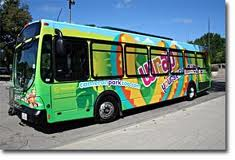 For people who do not have access to a private vehicle, public transit is a lifeline. In Waco that lifeline is pretty thin. First of all, in Waco the bus only comes around once an hour. It only operates during limited hours: Monday through Friday from 5:00 AM to 7:00 PM; Saturday from 6:00 AM – 8:00 PM; no service on Sundays. Also, our bus system is a “hub and spoke” system with all routes radiating from the Transit Center on Eighth street downtown. That means if you need to change buses to travel across town, it could end up taking you more than an hour to get to where you are going.
For people who do not have access to a private vehicle, public transit is a lifeline. In Waco that lifeline is pretty thin. First of all, in Waco the bus only comes around once an hour. It only operates during limited hours: Monday through Friday from 5:00 AM to 7:00 PM; Saturday from 6:00 AM – 8:00 PM; no service on Sundays. Also, our bus system is a “hub and spoke” system with all routes radiating from the Transit Center on Eighth street downtown. That means if you need to change buses to travel across town, it could end up taking you more than an hour to get to where you are going.
All of this has implications for employment. If you depend on public transportation, you can’t, for example, have a job that requires you to work on Sundays. If you miss your bus you could be an hour or more late to work. In recent years, we have added the evening LINK, a limited “reservation only” service that people can use to go to work or school between 8:30 and 11: 45 PM. That service has helped some for people who want to be able to work shifts that end after 7:00 PM, but additional service with shorter wait times would make the bus a much more viable option for getting back and forth to work.
I attended a meeting the other day hosted by Waco Transit in which the speaker discussed some of these realities. At the end of the presentation one of the questions he asked was: “Do you believe there is community and political support to increase public transit in the Waco community?” I hope so, for many reasons. Even though I may never personally have to depend on a city bus, I would like to be able to use it sometimes. Also, I am better off if my community is better off, and I believe my community is better off with stronger public transportation. Our community is better off if people who cannot yet afford a car have a dependable way to get back and forth to work in a reasonable amount of time. Our community is better off if families of modest means can get by with one vehicle instead of having to spend precious resources on a second car. Also, as Waco grows in population (and it will), a good public transit system will help us keep the traffic and congestion to a level that we can all tolerate. (Beware the traffic of Austin, my friends!) Selfishly, as I get older, I imagine there will come a time when I can no longer drive my own car. I believe our community is better off if our seniors have a bus system they can depend on to maintain some level of independence.
The Greater Waco Community only has a certain amount of money allocated for transportation related expenses. Our city planners are asking to hear from us about how we would like to see it spent. They have invited us to give our input at a series of public information meetings to be held at different locations around town during the next few weeks, see the details below. I hope you will attend and let them know that you would like to see some of that money invested in a more robust public transit system.
Here’s the invitation: The MPO staff would like to invite all interested persons to attend any of the following meetings regarding development of the new 2040 Metropolitan Transportation Plan. Monday, May 5, 2014 – 6 p.m. at Hewitt Community Center, 208 Chama Drive. Thursday, May 8, 2014 – 6 p.m. at Lacy Lakeview Civic Center, 505 Craven. Monday, May 12, 2014 – 6 p.m. at South Waco Community Center, 2815 Speight. Thursday, May 15, 2014 – 12 Noon at Dr. Mae Jackson Development Center, City of Waco, 401 Franklin Ave. For more information please visit the website: www.waco-texas.com/cms-mpo .
 This Act Locally Waco blog post is by Ashley Bean Thornton, the Manager of the www.www.actlocallywaco.org website and the editor of the Friday Update newsletter. The Act Locally Waco blog publishes posts with a connection to these aspirations for Waco. If you are interested in writing for the Act Locally Waco Blog, please email [email protected] for more information.
This Act Locally Waco blog post is by Ashley Bean Thornton, the Manager of the www.www.actlocallywaco.org website and the editor of the Friday Update newsletter. The Act Locally Waco blog publishes posts with a connection to these aspirations for Waco. If you are interested in writing for the Act Locally Waco Blog, please email [email protected] for more information.
by Jadi Chapman, Texas Hunger Initiative
If I were greeted everywhere the same way I am greeted when I walk through the doors of Harrison Senior Center life would be a joy. As I enter the senior center every week I am greeted with warmth, love, and a lot of hugs. I sit and talk with the senior citizens as they eat their lunch provided by Meals on Wheels. Every senior wants to tell me his or her story. They want to impart the wisdom they have gained from the Great Depression, the Great Wars, and illnesses that have befallen them and their loved ones. There are countless years of experience in the room, but as a senior shared with me, very few people want to listen to the knowledge gained from those experiences.
In most cultures the elderly are revered and respected. In Asian countries it is of the utmost importance to be respectful and to celebrate the elderly. In Latin culture it is commonplace for many generations to live together under one roof. The United States, however, is very youth-centric.
I had never really thought about issues that older Americans face. They gradually lose their independence as their health begins to fail and the symptoms of getting older set in. As I have gotten to speak with seniors over the past few months I have learned to admire and respect the beauty of aging. The seniors I spoke with are all so grateful and positive for what they have and the life they have lived.
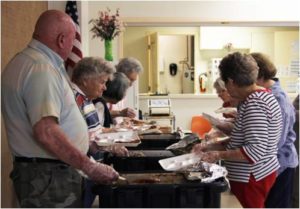 There doesn’t seem to be as much discussion or action around senior issues as there is around other social issues. It is hard to get people to rally around the aging population; people don’t see them as our future but as our past. Hunger among older Americans is something that can be forgotten when addressing food insecurity in the United States. Meals on Wheels serves 15 percent of the over half a million food insecure seniors in Texas. This leaves a substantial number of seniors wondering where their next meal will come from.
There doesn’t seem to be as much discussion or action around senior issues as there is around other social issues. It is hard to get people to rally around the aging population; people don’t see them as our future but as our past. Hunger among older Americans is something that can be forgotten when addressing food insecurity in the United States. Meals on Wheels serves 15 percent of the over half a million food insecure seniors in Texas. This leaves a substantial number of seniors wondering where their next meal will come from.
Because so many factors come into play when attempting to address senior hunger, it is an issue that is better addressed holistically. Some of these factors include:
- Financial insecurity
- Lack of transportation
- Special dietary needs
- Mental illness
Food insecurity among seniors is not simply a matter of not being able to afford to buy food. Sometimes seniors require specialized diets that are difficult to follow on a limited income. Metabolic illnesses, such as diabetes, impact what seniors are able to eat. Large supermarkets can also prove quite taxing for seniors. It takes a lot of energy to walk all over a large, crowded store when suffering from ailments such as arthritis, respiratory problems, or knee and hip replacements.
Alzheimer’s and Dementia can also have an impact on a senior’s nutrition. They may just forget to eat. Even if they have meals delivered, they may put the food in the fridge and then forget it is there. Many times the people who care for people with Alzheimer’s and dementia are seniors themselves. Sometimes these caretakers are so focused on the needs of the patient that they tend to neglect their own nutritional needs. When tackling senior hunger, it is important to approach the issue holistically. Mental, physical and emotional needs must be met in order to increase a senior person’s quality of life.
We were taught to respect our elders and look to them for wisdom, but American society tends to focus on our future instead of looking at our past to guide our future. May is Older Americans Month. Find a way to support the seniors in your community by donating your time to Meals and Wheels or Friends for Life, or by simply by helping the seniors in your community.
 This Act Locally blog post is by Jadi Chapman. She is a Field Organizer at Texas Hunger Initiative’s Waco Regional Office. Her focus is on issues facing seniors accessing food in the Waco community. If you would be interested in writing for the Act Locally Waco blog, please contact [email protected].
This Act Locally blog post is by Jadi Chapman. She is a Field Organizer at Texas Hunger Initiative’s Waco Regional Office. Her focus is on issues facing seniors accessing food in the Waco community. If you would be interested in writing for the Act Locally Waco blog, please contact [email protected].
.
by Felix Landry
The earth has many laws. Some of these laws – like the law of gravity – are well known. Others are less obvious. I’ve noticed a law at work both in nature and in the structure of cities which I call “the law of scale.” There is an important relationship between the size of the creature and the size of the environment it inhabits. They should “scale up” or “scale down” together. If one grows or shrinks without the other, the health of both the creature and the habitat begin to suffer. For example, it is obviously a problem if a mother bird does not make her nest big enough. What may be less obvious is that if the nest is too big that can also cause problems. If a bird builds her nest too large, then the upkeep of the nest eventually consumes the time and energy meant for gathering food and other necessary activities.
This law applies to people as well, but we are not as good at obeying it as the birds seem to be…particularly when it comes to transportation.
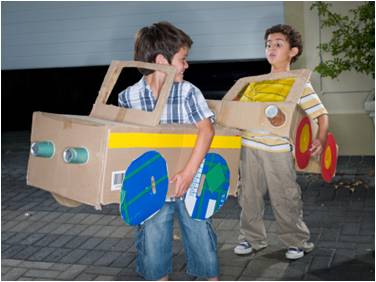 Imagine you work in a busy office building. There are lots of people in the halls all day, but everything generally flows smoothly. Then imagine that for some reason your employer implements the bizarre policy of requiring everyone to wear a refrigerator box whenever you travel the corridors. What would happen? Immediate, aggravating, stressful congestion in the halls. Why? Because your boss has broken the law of scale. You, the creature, got bigger, but the environment did not get bigger. The halls in your office building are built to human scale, not to refrigerator scale. If your boss were determined to continue this refrigerator box policy, the congestion would eventually drive you to take the expensive step of remodeling the building with much wider and longer corridors.
Imagine you work in a busy office building. There are lots of people in the halls all day, but everything generally flows smoothly. Then imagine that for some reason your employer implements the bizarre policy of requiring everyone to wear a refrigerator box whenever you travel the corridors. What would happen? Immediate, aggravating, stressful congestion in the halls. Why? Because your boss has broken the law of scale. You, the creature, got bigger, but the environment did not get bigger. The halls in your office building are built to human scale, not to refrigerator scale. If your boss were determined to continue this refrigerator box policy, the congestion would eventually drive you to take the expensive step of remodeling the building with much wider and longer corridors.
This is very similar to what we do with our current transportation system. When we step out of our homes or offices and into our vehicles, we suddenly explode in size like the incredible hulk. We, the creatures, have scaled up in size, but our environment, the roads, have not scaled up with us. We end up with maddening congestion such as we see along China Spring Hwy or anywhere in the City of Austin. We have broken the law of scale in regard to our city streets, and we will continue to have congestion until we restore the correct proportions.
For 50+ years of vehicle centric development we have tried to deal with this problem by scaling up the environment. We have “hulked out,” we reason, so our roads need to “hulk out” to keep up with us. We have basically fallen into the following pattern:
- More (and bigger) vehicles are on the road,
- Which leads to congested roads,
- Which leads to building wider and longer roads,
- Which in turn increases the distances between destinations,
- Which of course increases our dependence of vehicles,
- Which puts more vehicles than ever on the road.
The above cycle has two major problems in my opinion.
Problem 1: Between steps 2 and 3 whichever government agency wants to build the road must first gather the taxes to pay for the project. We are running out of tax money for road construction and maintenance, and not many people want to raise taxes.
Problem 2: Step 4 boils down to sprawl, which over the long haul decreases the average value of land serviced by the road system, while simultaneously increasing the amount of roads needed. The need for tax revenue increases while the capacity to generate it decreases.
In other words, our current approach to development is leading us to be like the bird who has made her nest too big. We are getting to the point that we must waste valuable resources just to maintain the nest.
Fortunately, there’s another way to approach the problem. We could figure out ways to not “hulk out” between our front doors and our destinations.
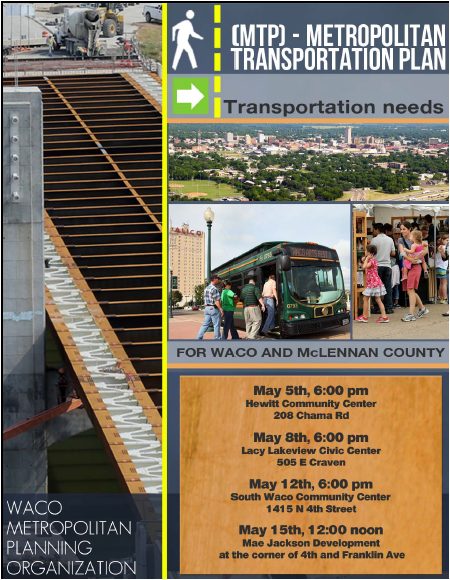 Let’s return to our crazy refrigerator boxes (vehicles) in the corridors (roads) at the office (city) analogy. The refrigerator boxes make each person take up too much space. The root of the corridor congestion is that the halls were not built for such a high space to person ratio.
Let’s return to our crazy refrigerator boxes (vehicles) in the corridors (roads) at the office (city) analogy. The refrigerator boxes make each person take up too much space. The root of the corridor congestion is that the halls were not built for such a high space to person ratio.
Here are some suggestions on how to lower the space to person ratio and ease congestion:
- Don’t take your box on every trip.
- Use smaller boxes.
- Fit more people in fewer boxes. If two or more people are headed to the same destination, they could all take the same box instead of each taking their own.
- Create a system of large high capacity community boxes that travel the main corridors of the office at regular intervals. Anyone could hop into a community box as it passes by decreasing the overall ratio of box area to person area.
Obviously these suggestions have real world counterparts:
- Walk
- Ride a bike
- Car pool
- Public transit
I am not trying to build a “cars are evil” bonfire. We don’t need to get rid of vehicles. But we could choose to scale ourselves down rather than choosing to scale up our road system. We could lower the amount of space people take up traveling on our roads. We could reduce the high vehicle to person ratio that is currently clogging our public right of ways. This “scaling down” could be much less expensive and more sustainable financially in the long run. The great news is that Waco, from what I’ve seen, has a large number of people who would love to lower their own vehicle to person ratio. Yes, we would have to make some initial investments to build the infrastructure to accommodate them. But, with enough support, Waco has great potential to facilitate a much lower vehicle to person ratio which will be a much more sustainable way to satisfy the “law of scale” in the long run.
 Felix Landry is the senior planner and bicycle and pedestrian coordinator for the City of Waco. He and his wife moved here in 2010 from College Station, Texas. They have two young boys.
Felix Landry is the senior planner and bicycle and pedestrian coordinator for the City of Waco. He and his wife moved here in 2010 from College Station, Texas. They have two young boys.
Are you Interested in getting in on the conversation about transportation in Waco? Plan to attend an upcoming Metropolitan Transportation Plan Community input meeting. Meetings are scheduled for May 5, May 8, May 12 and May 15. For more details please visit the website: http://www.waco-texas.com/cms-mpo/ or the Act Locally Waco May Event Calendar.
by Alan D. Northcutt, Waco Friends of Peace
Like most Wacoans, I used to purchase bottled water periodically. But then I learned the truth about this product:
- In the U.S. tap water is safe and is subject to more stringent federal regulations and inspections than bottled water.
- About half of bottled water brands are simply municipal tap water, but cost up to 1000 times the price of tap water.
- At a time when droughts are widespread, 3 liters of water are required to produce 1 liter of bottled water.
- The production and transportation of one bottle of water requires energy equivalent to the oil of a one quarter filled bottle. This process added 2.5 million tons of CO2 to the atmosphere in 2006.
- 75% of water bottle plastic ends up in landfills, lakes, streams and oceans, and requires centuries to decompose.
- The planet’s oceans are contaminated by five gigantic circulating patches of plastics and microplastics, the largest covering 500,000 square miles.
- Because animals mistake plastic for food, annually an estimated 1 million seabirds and 100,000 marine mammals die from plastic, and 2/3 of our fish stocks ingest plastic.
Since I became aware of these facts I have never purchased bottled water. We can all easily take steps to conserve precious natural resources while protecting the biosphere and its inhabitants by drinking water in reusable metal or reusable BPA-free plastic containers. I believe bottled water should be reserved for natural disasters and other emergency situations only.
 This week’s blog is by Alan D. Northcutt. Alan has lived in Waco for 28 years. He is a physician specializing in skin pathology. He has been active in the anti-war movement since college days, and heads the Waco Friends of Peace. Alan believes the most important issue facing mankind is climate change, which has become the primary focus of Friends of Peace. If you would be interested in writing for the Act Locally Waco blog, please contact Ashley Thornton by email at [email protected].
This week’s blog is by Alan D. Northcutt. Alan has lived in Waco for 28 years. He is a physician specializing in skin pathology. He has been active in the anti-war movement since college days, and heads the Waco Friends of Peace. Alan believes the most important issue facing mankind is climate change, which has become the primary focus of Friends of Peace. If you would be interested in writing for the Act Locally Waco blog, please contact Ashley Thornton by email at [email protected].
By Kelsey Scherer, Child Hunger Outreach Specialist
Since we know that Waco children and families struggle with hunger throughout the school year, we also know that hunger – like any other complex issue inextricably linked to poverty – doesn’t take a summer vacation. That’s why programs like the Summer Food Service Program, which we know locally as free Summer Meals for Kids, are critically important in our community. Waco ISD’s Child Nutrition Services has served free Summer Meals for over twenty years in partnership with school campuses, local churches, and nonprofit organizations, but this year, they’re doing things a little bit differently.
For the first time ever, Waco ISD’s Child Nutrition Services will be launching a new mobile meal program called “Meals on the Bus!” The program will address the longstanding barrier of inadequate access to transportation that has, for many years, been cited as a top reason that children are unable to visit summer meals sites and receive a nutritious meal. By bringing the meals directly to groups of kids at select locations, parents and advocates won’t have to worry about children crossing busy streets or traveling far from home in order to have access to a free lunch.
Two Waco ISD buses have been retrofitted with the collaboration of Waco ISD and STS, and will be fully equipped to serve hot meals to up to 40 children at a time. Children will line up and receive their meals inside the bus, where they will be able to sit in the bus seats and enjoy their meal safely and in the comfort of an air-conditioned space. Targeted stops will include apartment complexes and areas with high densities of children who could benefit from the meal. The site list will be announced soon, but several great partners, including the Waco Public Library System, are on board. Like any traditional Summer Meals site, this program provides limitless potential for partnership with churches, community organizations, state agencies, and others, who have the desire and flexibility to provide summer programming and enrichment to children on-site. Waco ISD will also operate many traditional, non-mobile sites throughout the summer, as always.
 This summer, you will also see Waco’s newest child nutrition program sponsor, CitySquare, launching their mobile Food on the Move program in Waco and beyond! The fact that this summer, Waco will be graced with the presence of not one, but two, food sponsors trying out new meal service models speaks to the willingness of groups to collaborate and coordinate services on behalf of Waco children and families. It also reflects the strength of growing efforts to innovate and come up with creative, strategic solutions to challenges within this space. CitySquare has done an excellent job of coordinating dinner meal service to over 900 children daily at participating afterschool programs in Waco since January 2014.
This summer, you will also see Waco’s newest child nutrition program sponsor, CitySquare, launching their mobile Food on the Move program in Waco and beyond! The fact that this summer, Waco will be graced with the presence of not one, but two, food sponsors trying out new meal service models speaks to the willingness of groups to collaborate and coordinate services on behalf of Waco children and families. It also reflects the strength of growing efforts to innovate and come up with creative, strategic solutions to challenges within this space. CitySquare has done an excellent job of coordinating dinner meal service to over 900 children daily at participating afterschool programs in Waco since January 2014.
Both of these programs have been in the planning stages for several years, but additional energy, fresh resolve, and technical assistance were brought to the table when the CHAMPS grant, sponsored by National League of Cities (NLC) and Food Research and Action Center (FRAC) and funded by the Walmart Foundation, was awarded to the City of Waco’s Parks and Recreation Department. The specific goal of this grant is to increase the number of children who participate in the federally-funded Summer and Afterschool Meals programs, and we have already seen those numbers increase through afterschool meals as a result of the work of this team (of which I am, of course, a totally unbiased member). I am thrilled that our city is being proactive in launching a new model for meal service that has potential to positively impact the wellbeing of children, teens, and families. I am encouraged that we have already seen similar programs be enormously effective in other Texas communities, and I look forward to helping these leaders try out this model in our own community, tailoring it to the specific needs and desires of our neighbors. I can’t wait to see all that will come of these unique partnerships, and see new partnerships and collaborations formed around these great programs.
Keep your eyes peeled for Waco ISD’s “Meals on the Bus!” and CitySquare’s “Food on the Move” serving free Summer Meals to kids and teens ages 18 and under in early June, and an advertising campaign beginning soon. If you want to get involved by supporting a Waco ISD or CitySquare site through volunteers and activities for kids, or helping spread the word, please contact Kelsey Scherer at [email protected] or 254-300-7801.
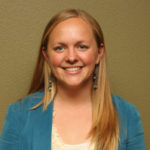 Kelsey Scherer blogs for Act Locally Waco about Food Security and related issues. She is a Child Hunger Outreach Specialist at Texas Hunger Initiative’s Waco Regional Office. Kelsey is also a team member for the CHAMPS grant. The CHAMPS project aims to equip city leaders, anti-hunger groups, and the broader community to more effectively combat child hunger with the help of summer and afterschool meal programs.
Kelsey Scherer blogs for Act Locally Waco about Food Security and related issues. She is a Child Hunger Outreach Specialist at Texas Hunger Initiative’s Waco Regional Office. Kelsey is also a team member for the CHAMPS grant. The CHAMPS project aims to equip city leaders, anti-hunger groups, and the broader community to more effectively combat child hunger with the help of summer and afterschool meal programs.
By Ashley Bean Thornton
Art on Elm was on April 13 last year. The night before, at the preview party, the organizers had arranged for a photographer. He had a big picture frame suspended from some wires and an assortment of goofy hats and other accessories to entice people to pose within the frame for a picture. My friend Ramona and I took full advantage — she wore the pink feather boa and I wore the huge crown. We had a blast.
The next day was one of those fine Texas spring days that make you remember why you love living here – perfect temperature, blue sky. I had breakfast at the Farmer’s Market, then headed over to Elm Avenue to enjoy the art festival. I strolled through the booths, yakked with some friends, listened to some fantastic music and enjoyed a scone at Lula Jane’s. On my way home from Art on Elm I decided to swing by the Habitat Restore on Franklin. They were having their annual half-price sale. The first thing I noticed when I walked through the door was a huge stack of big three-foot-square picture frames. Originally priced at $10 each, they were $5 each for half-price day. Who can resist that? I bought two.
One of my extra-curricular activities is managing a website called Act Locally Waco. The idea of the website is that everyone has a part to play in making our community a terrific place to live. It is kind of like an on-line Greensheet for getting involved in Waco. It’s full of local events, volunteer opportunities, announcements, resources… all kinds of things that contribute to the general greatness of Waco. Of course you can’t have a website these days without also having a “social media presence,” so I run the Act Locally Waco Facebook page as well. I am no social media expert by any means, but in my limited understanding, what makes Facebook fun is pictures.
It seemed providential that these $5 frames at the Re-store appeared in my life so immediately after having such a great time with a picture frame at the Art on Elm preview party. It sparked an idea: what if I take one of these picture frames with me on my adventures around town and catch people in the act of getting involved in Waco and then post them on the Facebook page? Why not? I bought a can of orange paint and painted one of the frames to match the orange in the website. Thus was born The Big Orange Frame.
In the course of a year I’ve lugged that frame to dozens of events and activities: The L.I.F.T. Workshop at First Baptist, Farm Day, Juneteenth, the Education Alliance Summit, the Farmer’s Market, First Friday Downtown, the East Waco Library mural party, The Texas Hunger Initiative Summit, The Cultural Arts Festival, Winter Wonderland, so many more… I cannot possibly list them all in the space available here.
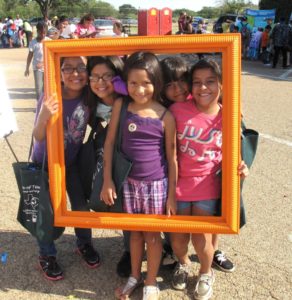 It turns out that more people than you might think find it hard to resist a middle-aged lady in red tennis shoes with a giant orange picture frame and a camera. I bet I’ve taken almost a thousand pictures this year. I have pictures of every size, shape, race and age of person you can imagine. I also have pictures of a fair number of dogs, one goat, and a chicken of some kind – all captured in the Big Orange Frame. That $5 investment has paid for itself over and over in laughter and fun.
It turns out that more people than you might think find it hard to resist a middle-aged lady in red tennis shoes with a giant orange picture frame and a camera. I bet I’ve taken almost a thousand pictures this year. I have pictures of every size, shape, race and age of person you can imagine. I also have pictures of a fair number of dogs, one goat, and a chicken of some kind – all captured in the Big Orange Frame. That $5 investment has paid for itself over and over in laughter and fun.
It’s been right at a year since the Big Orange Frame was born, and it struck me that it would be fun for the one year anniversary to try to put all the pictures on display somehow. My friend Susan Mullally in the Baylor Photography Department and John Orr at Frames, etc. on Bosque came to my aid, and thanks to them we figured out a way to get about 350 of them printed and framed in five giant posters in time to show them off at Art on Elm this year. That’s not nearly all of them, but it is an impressive chunk.
While working on that project I spent one entire afternoon looking at the years’ worth of pictures. It turns out I am not that great of a photographer. Many of the pictures are too shady or too bright…oh, but the people, the faces…each one is incredibly beautiful. Looking at the faces of our community, one after another – kids and middle aged folks and older people, every color and shape, smiling and shy, in groups and alone – struck a chord deep inside me, a chord that I don’t always attend to in the midst of my busy life. I cannot adequately describe how precious we all seemed to me in that moment. I got teary-eyed looking at those faces, and I’m getting teary-eyed again writing about it.
It reminded me of a quote from the Trappist monk Thomas Merton that I heard a long time ago. He had his epiphany watching the busy crowds walk by at the corner of Fourth and Walnut in Louisville, Kentucky. I had mine at a computer looking at beautiful faces from Waco, Texas, but the sentiment is the same: “I’m a member of the human race just like everyone else. I was suddenly overwhelmed with the realization that I loved all those people, that they were mine and I theirs, that we could not be alien to one another even though we were total strangers. …. A member of the human race! To think that such a commonplace realization should suddenly seem like news that one holds the winning ticket in a cosmic sweepstake. …I have the immense joy of being a member of the human race: if only everybody could realize this! There is no way of telling people that they are all walking around shining like the sun.”
 This Act Locally Waco blog post is by Ashley Bean Thornton, the Manager of the www.www.actlocallywaco.org website and the editor of the Friday Update newsletter. The Act Locally Waco blog publishes posts with a connection to these aspirations for Waco. If you are interested in writing for the Act Locally Waco Blog, please email [email protected] for more information.
This Act Locally Waco blog post is by Ashley Bean Thornton, the Manager of the www.www.actlocallywaco.org website and the editor of the Friday Update newsletter. The Act Locally Waco blog publishes posts with a connection to these aspirations for Waco. If you are interested in writing for the Act Locally Waco Blog, please email [email protected] for more information.
by Ryn Farmer, Community Organizer, Waco Community Development Corporation (Waco CDC)
I have really been soul-searching over the last few years about what it means to be culturally competent. It is a term widely used in the social work field and has also gained a lot of traction in the medical field over the past few decades. I think it is something we need to really think about because we all come from such different experiences and ways of living. The idea behind “cultural competency” stems from the desire to respond respectfully across cultures and provide sensitive, holistic care to clients. It is about educating ourselves, before we meet people, about their culture so that we can respond thoughtfully and effectively. All of that sounds great, right? But for some reason this phrase has never really resonated with me.
Before I talk more about cultural competency, I want to make sure we are defining culture the same way. So as a basis for my thoughts, I’m defining culture as our traditions, norms, customs and beliefs in relation to gender, age, race, sexual orientation, socio-economic status, religion, language, etc. We operate from our core beliefs – both the internal and external elements that influence our life – and that affects (but does not determine) the way we think, how we behave and what we believe.
The phrase “cultural competency” indicates to me that we can arrive at something, that there is an ending point. That seems rather presumptuous because I know I could never be fully culturally competent. Of course, the philosophical underpinnings of cultural competency are good and desirable, and it is definitely a starting point. Many individuals won’t even begin a conversation about race, gender, sexual orientation, etc., because they are afraid they will say the wrong thing or because they have no idea what to say at all. We keep quiet because we are afraid of offending, or we decide to speak up and sound like a blundering idiot. So what is the answer? Don’t say anything at all and keep living in a world where deep injustice exists and too afraid to do anything? Speak from our limited knowledge and interactions with people and end up saying something foolish? Maybe there is another way… What if we approached culture in a slightly different manner? What if, instead of guiding our approach with the notion of “competence,” we approached with humility?
The idea of cultural humility is much more meaningful to me than cultural competency. In cultural humility, I can come from a place of learning rather than of expertise… a place of openness and of asking questions to better understand where someone is coming from, rather than assuming I already know them.
Dr. Melanie Tervalon and Jann Murray-Garcia have produced significant and meaningful information about cultural humility and describe it as a “life-long process of self-reflection and self-critique.” Self-awareness and reflection are the main ideas behind it, but there are other factors that come to play as well. It also involves recognizing and seeking to change power imbalances that exist in our communities and developing institutional accountability so that as institutions we are responding sensitively to the needs of people. For me, the notion of cultural humility takes away the idea that each culture has a set of rules that everyone follows. I think if we hold to the cultural competency way of thinking, then our interactions with people are limited to what we think are the beliefs and ways of living that exist in their “rulebook”.
I was at a meeting recently and one of the women at my table started speaking about how she wished we would quit viewing each other as objects and commodities but rather view each other as people. She talked about how we need to focus more on building relationships with each other first rather than focusing on yet another task to get done. We often assume we know each other because we run in similar circles or go to multiple meetings with the same people. But we don’t. We have only scratched the surface. So my friend was saying we need to take time to actually know each other. At the end of the meeting, my friend who said she didn’t want to be an object anymore was asked to lead a group. The person asking her said, “Because we need some color on our leadership team. And you’ve got color!” [Insert deep sigh of frustration and anger]. We have so far to go in being sensitive, in stopping to think about what we say before we say it and in truly looking at someone as a person. We must ask questions to really understand who someone is and not assume we know them because we have one gay friend, or one African American friend, or one Jewish friend.
If we really want to understand each other and start collaborating more together, we cannot paint a picture of any culture with a broad stroke of our brush. To do so would be foolish and circumscribed. So rather than viewing the individuals in our life as a token-something-or-other, why not actually view them as people? View them as someone with strengths to be discovered, and value them for what they can bring to the proverbial ‘table’ of life. Ask meaningful and engaging questions while coming from a place of appropriate inquisitiveness and openness. And before we do any of that, let’s start by seeking to discover our own beliefs and assumptions, and challenging ourselves in the idea that our values should be held above others.
We need to come from a place of learning. Of humility. And we need to never feel like we have arrived. Because when we believe we understand an individual because we think we understand their culture, we lose sight of the uniqueness of who they are and the gifts they can offer. Of course, there has to be grace and patience wrapped up in this whole process. I am so incredibly thankful for all of my friends who have poured out both of those things on me over the years as I struggle to better understand them. But I hope that if I, and others, come from a place of listening, of love, of reflection and of acceptance, we can accomplish a great deal more living in community together in this messy, beautiful and diverse world.
If you are interested in learning more about cultural humility, you can watch this 30 minute documentary produced by Vivian Chavez, an Associate Professor at San Francisco State. Also, my friend Jody Fernando has compiled incredibly thoughtful reflections from her blog Between Worlds into a book called Pondering Privilege: Toward a deeper understanding of whiteness, race, and faith.
 This Week’s Act Locally Waco Blog post is by Ryn Farmer. Ryn is a Community Organizer at the Waco Community Development Corporation (Waco CDC). Waco CDC helps to inspire and cultivate healthy neighborhoods. They consider a healthy neighborhood to be one that is safe, clean, and diverse; one in which it makes economic sense for people to invest and one where neighbors manage change successfully. If you would be interested in writing for the Act Locally Waco blog, please send an email expressing your interest to [email protected].
This Week’s Act Locally Waco Blog post is by Ryn Farmer. Ryn is a Community Organizer at the Waco Community Development Corporation (Waco CDC). Waco CDC helps to inspire and cultivate healthy neighborhoods. They consider a healthy neighborhood to be one that is safe, clean, and diverse; one in which it makes economic sense for people to invest and one where neighbors manage change successfully. If you would be interested in writing for the Act Locally Waco blog, please send an email expressing your interest to [email protected].
by Phil York, Act Locally Waco Housing and Homelessness Policy blogger
“It is simply unacceptable for individuals, children, families and our nation’s Veterans to be faced with homelessness in this country” – President Obama, June 18, 2009.
Who is your favorite superhero?
It seems like the silver screen is flush with superhero smash hits every summer. Batman, with his man cave and great car, is my second favorite superhero. But before I was acquainted with Warner Brothers and Marvel Comics, my first favorite superhero was (and continues to be) my Father. Like all other superheroes, my Dad wore a superhero suit (his uniform), and in my eyes, saved the world each day during his career in the United States Navy.
In my previous posts we have discussed the broad implications of homelessness and how homelessness affects our community, our economy and our youth. Today we will unwrap a basic understanding of homelessness among Veterans: Our American Heroes.
National Policy
The Obama Administration publically calls housing a basic human right. The flagship federal agency for housing initiatives, policy, and public funding related to housing is Housing and Urban Development (HUD). Under the leadership of Secretary Shaun Donovan, HUD and many other agencies partner so we can do more about homelessness through a holistic approach. That collaborative group is called The United States Interagency Council on Homelessness (USICH). It is an independent agency comprised of 19 Cabinet Secretaries and agency heads that coordinate responses to homelessness. HUD, USDA, Department of Veteran Affairs, Social Security Administration, and Department of Homeland Security are just a few of the partner agencies involved.
This interagency collaboration is mandated by The Hearth Act (signed into law by President Obama May 2009). President Obama’s Opening Doors Plan (drafted in 2010), is the United States’ first comprehensive strategy to prevent and end homelessness. The Plan is focused on four key goals: (1) Finish the job of ending chronic homelessness in five years; (2) Prevent and end homelessness among Veterans in five years; (3) Prevent and end homelessness for families, youth, and children in ten years; and (4) Set a path to ending all types of homelessness. USICH uses this plan to guide program implementation.
How are we doing?
Here is a timeline of the progress that has been reported regarding homeless Veterans:
2009 – According to President Obama’s plan document (p. 20), in 2009, the VA estimated 107,000 homeless Veterans on any given night.
2010 – According to Green Doors, a central Texas nonprofit corporation and a Veteran advocacy group, the Department of Veteran Affairs (VA) estimated that on any given night there were 76,000 homeless veterans sleeping on American streets.
2011 – On December 13, 2011, HUD released the 2011 Point-In-Time Count Report that showed there were 67,495 homeless veterans in the United States (including sheltered and unsheltered). Among those reported were 1,500 in Texas, and 40 in Waco/McLennan County.
2012 – According to Housing and Urban Development’s Point-in-Time Survey, January 2012, 62,619 veterans were homeless on a single night in January 2012. Texas had by far the largest number of homeless veterans among statewide counts with 1,481 homeless veterans on a single night.
2013 – HUD’s “2013 Continuum of Care Homeless Assistance Programs Homeless Populations and Subpopulations Report” states the count of homeless veterans (sheltered and unsheltered) as 58,063. According to a blog post by Secretary Donovan on December 2013, “The numbers since 2010 when Opening Doors was created are encouraging… homelessness among Veterans fell an incredible 24 percent.” He credits this improvement to the strong working partnership between HUD and Veterans’ Affairs and to a commitment to learning from evidence-based research.
A lot left to Un-Wrap
The most common metric in homelessness policy is the Point-In-Time Count. Most communities conduct a Point-In-Time count once a year, usually in January. It counts people who are unsheltered or in emergency shelters or transitional housing. Families, youth, and other individuals who are doubled up are not included. The Point-in-Time Count may be the best we can do as far as measuring homelessness, but it is far from perfect.
When I served as a Point-In-Time surveyor in Brazos County, “are you a Veteran?” was a question on the verbal survey. There are several important things to consider about that question:
- The survey itself is voluntary
- This specific question is a voluntary, self-selected answer
- Depending on its place in the survey order, it may not be asked before the participant elects to end the conversation
- The participant needs to trust the surveyor; without trust little information can be collected.
Given the flaws of the Point-In-Time Survey that several of our sources identify, I am reluctant to share HUD’s rosy estimate of the progress that has been made. I agree that the data from multiple sources supports the conclusion that we have made at least some steps in the right direction; the question remains of how large those steps have been.
I say that not to be pessimistic about our progress, but to make sure we complete the race before we celebrate its end. If data points are used to judge success or failure of our agencies we need to know as informed citizens the nature of that data. The data collection challenge is a reoccurring theme across all topics and demographics of homelessness. It is worth describing in each blog as it affects each group uniquely.
One uniform opinion across data sources is that the true number of homeless veterans is more than likely higher than the estimate. Much work remains to be accomplished with this important population. Considering their sacrifice, our Veterans and their families remain our heroes long after they retire their uniforms. I look forward to our next discussion about this important topic.
 Phil York, Director of Development at Waco Habitat for Humanity, is a self-described “policy nerd;” he is also the Act Locally Waco housing and homelessness policy blogger. You can direct questions to Phil to [email protected]. Would you be interested in blogging for Act Locally Waco? If so please email [email protected].
Phil York, Director of Development at Waco Habitat for Humanity, is a self-described “policy nerd;” he is also the Act Locally Waco housing and homelessness policy blogger. You can direct questions to Phil to [email protected]. Would you be interested in blogging for Act Locally Waco? If so please email [email protected].

